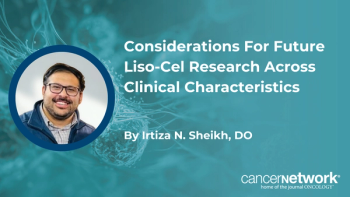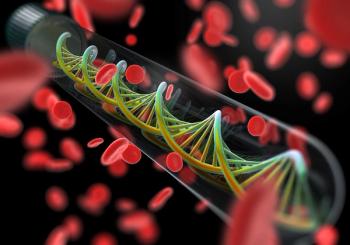
Could Pre-Transplant PET/CT Deauville Score Predict Treatment Failure in R/R DLBCL?
Researchers looked at the pre-transplant PET/CT Deauville scores of patients with relapsed or refractory diffuse large B-cell lymphoma treated with R-DHAC to see if patients with a higher score had a higher risk for treatment failure.
Among patients with relapsed or refractory diffuse large B-cell lymphoma (DLBCL) treated with rituximab, dexamethasone, high-dose cytarabine, carboplatin (R-DHAC), a Deauville score of 5 or greater on pre-transplant PET/CT had a higher risk for treatment failure, according to a study published in
However, a positive PET/CET scan with a score of 4 did not preclude a patient undergoing successful transplant, the study found, reported
The study included 62 patients with relapsed or refractory disease diagnosed between January 2008 and May 2016. All patients were treated with R-DHAC and scheduled for transplant after at least one course of chemotherapy.
PET/CT scan results were classified using the Deauville 5-point scale: 1 means no uptake; 2, uptake less than or equal to that of the mediastinal blood pool; 3, uptake greater than that of the pool but less than or equal to that of the liver; 4, uptake greater than that of the liver; and 5, uptake greater than that of the liver or evincing a new site of disease.
With a median follow-up time of 53 months, the 4-year progression-free survival rate was 83% and the overall survival rate was 88%. During follow-up post-transplant, 10 patients experienced progression and 7 of these patients died.
Overall, half of patients had a positive pre-transplant PET/CT scan. Twenty-one patients had a Deauville score of 4 and 9 had a score of 5. A positive pre-transplant score of 5 was associated with shorter progression-free survival compared with patients with a score of 1 to 4. According to the researchers, novel therapies, such as CAR T-cells should be considered in these patients. Deauville score did not influence overall survival.
“Pretransplant total lesion glycolysis value was also a strong prognostic factor and should be further analyzed in prospective studies,” the researchers wrote.
In fact, pre-transplant total lesion glycolysis value was associated with both increased risk for progression-free survival and overall survival, and was “the most powerful prognostic factor”, the researchers wrote.
The study had several limitations including its retrospective design, and the small number of patients.
“Overall progression-free survival and overall survival of relapsed and refractory DLBCL patients were slightly better than expected from published data (83% and 88% vs 49–67% and 66–74% respectively), even though proportions of adverse known prognostic factors were similar in comparison with the literature,” the researchers noted. “The 5-year estimated incidence of relapse and of non-relapse mortality was 16.9% and 8.4%, respectively. Overall, the lower number of events could have hampered our analysis.”
Newsletter
Stay up to date on recent advances in the multidisciplinary approach to cancer.










































